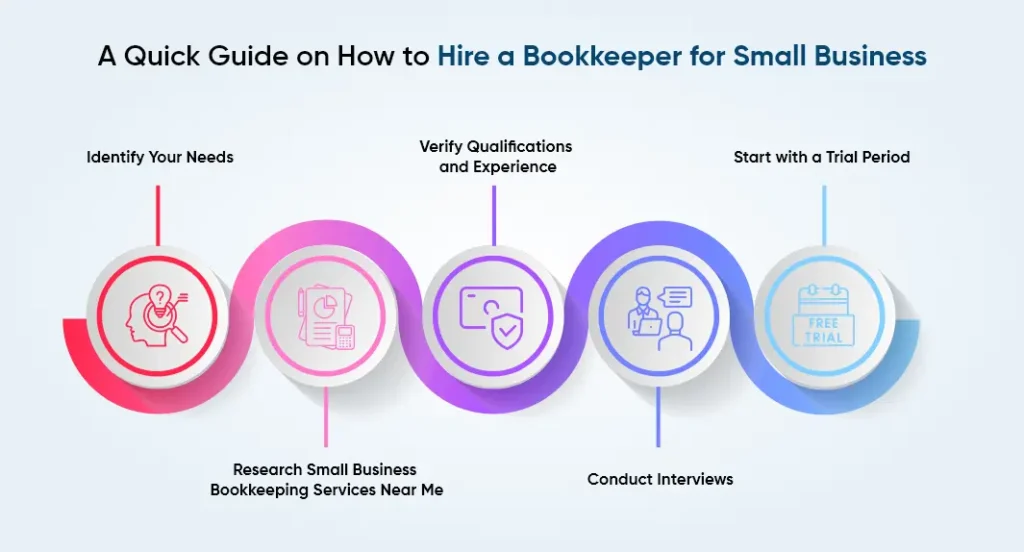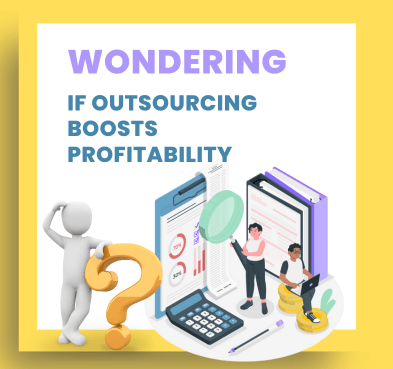Managing finances is one of the biggest challenges small businesses face nowadays. Bookkeeping demands accuracy, time, and expertise. Without proper financial management, a business can quickly run into trouble. This is why hiring a bookkeeper for a small business is inevitable. A professional bookkeeper ensures financial records are accurate and up to date. This will free up time for business owners to focus on growth. This blog will explore the many benefits of bringing a bookkeeper on board, especially for small enterprises.
Benefits of Hiring a Bookkeeper for a Small Business
Hiring a bookkeeper for any scaled business offers numerous advantages that go beyond mere number crunching. It streamlines financial operations, enhances accuracy, and provides critical insights that can drive business growth.
In this section, we will delve into the various benefits that an expert bookkeeper brings to small businesses.

1. Time Savior
Bookkeeping services for small business allow owners to focus on their core strengths. This significantly boosts productivity and growth.
- Focus on Core Business Activities
Outsourcing bookkeeping tasks liberates business owners from the time-consuming responsibility of managing financial records. This enables them to dedicate more time to strategic areas like product development, marketing, and customer service. - Efficient Financial Management
Professional bookkeepers bring efficiency to accounting and financial management. Undoubtedly, they are adept at handling financial tasks swiftly and accurately. Certainly, it means that business owners do not have to spend hours balancing ledgers or managing invoices. This efficiency saves time. Furthermore, it ensures that financial records are kept up to date, which provides a clear and current financial picture.
2. Expertise and Accuracy
Bookkeepers offer specialized knowledge and precision to enhance the accuracy of financial records and reduce errors.
- Professional Expertise
Bookkeepers possess extensive knowledge and training in financial management. They understand complex accounting principles and are adept at using various accounting software. Unquestionably, this professional expertise ensures that all financial transactions are recorded correctly, adhering to relevant accounting standards and regulations. - Reduced Errors
The risk of financial errors can be significantly reduced with an expert bookkeeper. Mistakes in financial records can lead to serious consequences, including incorrect tax filings and financial discrepancies. A bookkeeper’s meticulous approach to maintaining accurate records helps prevent these errors. Therefore, it ensures that the business’s financial data becomes reliable and precise.
3. Cashflow Management
Effective cashflow management by bookkeepers helps maintain a healthy financial balance and avoids liquidity issues.
- Optimized Cashflow
Bookkeepers play a crucial role in monitoring the cashflow of a business. They track all incoming and outgoing funds, which ensures that there is always enough cash available to meet operational needs. This careful monitoring helps avoid cash shortages that can disrupt business operations. - Budgeting and Forecasting
Bookkeepers assist in creating detailed budgets and financial forecasts. By analyzing historical financial data, they help predict future cashflow trends and financial needs. This foresight allows businesses to plan better, allocate resources efficiently, and make informed financial decisions.
4. Financial Insight
Hiring a bookkeeper for a small business assures that a business owner receives valuable financial insights that aid in strategic decision making and business planning.
- Informed Decision Making
A bookkeeper provides business owners with comprehensive financial reports that offer a clear understanding of the business’s financial health. These reports include profit and loss statements, balance sheets, and cash flow statements. With this information, owners can make informed decisions that drive business growth and stability. - Performance Analysis
Regular financial reporting enables business owners to analyze their company’s performance over time. This analysis helps identify trends, strengths, and areas for improvement. It further guides future strategies and operational adjustments.
5. Tax Compliance
Bookkeepers ensure that businesses comply with tax regulations and stay protected from penalties and legal issues.
- Stay Compliant
Tax laws and regulations are complex and frequently updated. Bookkeepers stay well informed of these changes. This ensures that the business complies with all relevant tax requirements. This proactive approach helps avoid penalties and legal issues that can arise from non-compliance. - Efficient Tax Preparation
Bookkeepers handle all necessary documentation and records required for tax filings. Their expertise ensures that taxes are prepared accurately and submitted on time. This reduces the stress and hassle associated with tax season. This efficiency also helps in maximizing tax deductions and benefits.
6. Cost Efficiency
Outsourcing bookkeeping can be more cost effective than hiring in-house staff.
- Affordable Expertise
Outsourcing bookkeeping services for small business or hiring a bookkeeper from an offshore company is often more economical than hiring a full-time, in-house bookkeeper. Remote bookkeepers offer their expertise at competitive rates. Moreover, they often provide flexible pricing models, which makes professional bookkeeping accessible to businesses with limited budgets. - Reduce Overheads
Hiring a remote bookkeeper eliminates the need for additional office space, equipment, and resources. This reduction in overhead costs allows businesses to allocate their funds more efficiently, investing in other critical areas such as marketing, product development, or employee training.
7. Stress Reduction
Professional bookkeeping reduces the stress associated with managing financial records, providing peace of mind to business owners.
- Peace of Mind
Knowing that a professional is handling the financial records brings significant peace of mind to business owners. They can rest assured that their finances are in capable hands, which allows them to focus on other aspects of the business without worrying about financial management.
- Avoid Financial Mistakes
Bookkeepers’ expertise reduces the likelihood of financial mistakes. Accurate bookkeeping ensures that the business’s financial data is reliable, which is crucial for making informed decisions. This reliability reduces the stress of potential errors and their repercussions.
8. Scalability and Adaptability
Bookkeeping services can scale with the business, adapting to its growing and changing needs.
- Adapt to Growth
As a business grows, its financial needs become more complex. Bookkeepers can easily scale their services to match these increasing demands. Whether the business needs more detailed financial analysis or expanded bookkeeping services, a professional bookkeeper can adapt to these changes seamlessly.
Also Learn: How Outsourced Bookkeeping Services Can Help in Growing your Business?
- Customized Services
Remote bookkeepers can offer customized services tailored to the specific needs of a business. Whether it’s managing payroll, handling more complex financial tasks, or providing detailed financial reports, bookkeepers can adjust their services to meet the unique requirements of each business.
9. Technology and Automation
Bookkeepers leverage modern technology and automation tools to enhance efficiency and accuracy in financial management.
- Leverage Modern Tools
Professional bookkeepers utilize advanced accounting software and tools to manage financial records. These technologies automate repetitive tasks such as data entry, invoicing, and reconciliation, which reduces manual errors and increases overall efficiency. - Real-Time Financial Data
With the help of technology, bookkeepers can provide real time financial data to business owners. This immediate access to up-to-date information allows for quicker decision making and better financial management.
10. Audit Readiness
Bookkeepers ensure that financial records are always audit-ready, maintaining compliance and transparency.
- Prepare for Audits
Bookkeepers maintain organized and accurate financial records. Therefore, it makes it easier to prepare for audits. They ensure that all necessary documentation is in order and readily accessible, which simplifies the audit process and reduces the stress associated with it.
- Compliance and Transparency
Accurate bookkeeping ensures that the business is always in compliance with financial regulations. This transparency builds trust with stakeholders, investors, and regulatory bodies. Being audit-ready also enhances the business’s credibility and can be crucial for securing funding or investment.
A Quick Guide on How to Hire a Bookkeeper for Small Business

1. Identify Your Needs
- Assess Scope of Work: Identify the specific bookkeeping tasks your business requires, such as invoicing, payroll, or financial reporting.
- Decide on Full-time vs. Part-time: Determine whether you need a bookkeeper on a full-time, part-time, or freelance basis.
- Consider Remote vs. In-house: Evaluate whether a remote bookkeeper or an in-house bookkeeper suits your business model better. Certainly, a remote one has way more benefits than hiring an in-house professional, particularly for a small business.
2. Research Small Business Bookkeeping Services Near Me
- Local Listings: Search for local bookkeeping services that cater specifically to small businesses.
- Online Platforms: Use online platforms like LinkedIn, Upwork, or specialized bookkeeping service websites to find qualified professionals.
3. Verify Qualifications and Experience
- Check Credentials: Ensure the bookkeeper has relevant qualifications, such as certification from recognized accounting bodies.
- Evaluate Experience: Look for a bookkeeper with experience in your industry or with similar-sized businesses.
4. Conduct Interviews
- Prepare Questions: Ask about their bookkeeping processes, software proficiency, and experience with tax compliance.
- Discuss Scenarios: Present hypothetical situations to understand how they handle specific bookkeeping challenges.
5. Start with a Trial Period
- Short-term Agreement: Consider starting with a short-term contract to assess the bookkeeper’s performance.
- Evaluate Fit: Monitor their work quality, communication, and compatibility with your business during the trial period.
Why Should Small Businesses Consider Hiring a Remote Bookkeeper for Small Businesses?
Hiring a bookkeeper for a small business offers significant cost savings. Offshore professionals typically charge lower rates due to different living costs. This allows small businesses to access expert financial management without straining their budget. These savings can be reinvested into other critical areas of the business.
Offshore bookkeepers bring high expertise and flexibility. They often hold certifications from recognized accounting bodies and can handle various bookkeeping tasks efficiently. Their availability across different time zones ensures prompt financial management, enhancing business operations.
Additionally, offshore bookkeepers are adept at using advanced accounting software and cloud-based platforms. This technological proficiency ensures accurate, secure, and accessible financial records. Ultimately, hiring an offshore bookkeeper can improve a small business’s financial health and operational efficiency.
Also Read: 10 Things to Consider Before Hiring a Remote Bookkeeper
Frequently Asked Questions
Ensure the bookkeeper has relevant qualifications and experience. Secondly, you must check their proficiency with accounting software. You should conduct interviews and consider starting with a trial period to assess their performance.
A bookkeeper monitors incoming and outgoing funds to ensure a healthy cashflow for a small business and avoid shortfalls. They also assist in budgeting and forecasting future financial trends.
You can search local listings and online platforms like LinkedIn and Upwork for qualified professionals. Asking for referrals from other small business owners can also be helpful. You may also look for business directories or featured articles listing the top companies or experts offering these services.
Conclusion
By hiring a bookkeeper, owners can reap numerous benefits that contribute to the overall health and growth of their enterprise. From saving time and reducing stress to ensuring compliance and scalability, the advantages are clear and compelling. Offshore bookkeeping services ensure a positive impact on your business.
Hiring a bookkeeper for a small business can significantly enhance financial management and operational efficiency. Consider offshore bookkeeping services for cost effective expertise and flexible support. To take the next step today and streamline your finances for better business growth, contact us now.
















